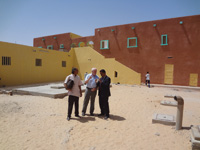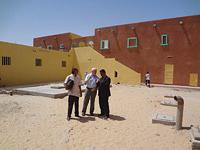West African Torture: Canadian research reveals
(NC) — Alex Neve, head of the Canadian arm of the human rights organization Amnesty International, recently led a research mission to Mauritania in West Africa to look into allegations of torture. Amnesty's work is funded by the organization's 3.2 million global members (including 80,000 in Canada) and the organization conducts over a hundred research missions in a typical year.
Neve and his colleagues spent many days in Central Prison in the Mauritanian capital Nouakchott. They interviewed about 30 people who had been convicted on terrorism-related charges, and sentenced to punishments ranging from one year's imprisonment to the death penalty. All provided the Amnesty team with detailed descriptions of the torture they experienced in police custody.
Among the prisoners were a number of foreigners, including a Canadian, Aaron Yoon from London, Ontario, who had been held for more than 18 months and was subsequently released and returned home.
From all the conversations Neve had with survivors of human rights abuses and their relatives, one question stayed in his mind. A woman, whose children cannot access public schools or health care because their father is imprisoned in an unknown location for reasons of 'public security', asked: “This is their view of security?”
Her husband and 13 other men have been held in a secret location since May 2011, having been convicted of charges related to terrorism. For more than two years they have had no contact with their families or access to lawyers. Authorities say the men are still alive, but they won't say where they are being held and will not allow visits.
According to Neve, the men's children can only be registered for public schools and health care if their fathers have been properly inscribed in the new census (impossible if you are “disappeared”) or if a death certificate is available (impossible if you are still alive).
“This impossible situation seems to be routine in Mauritania, particularly when it comes to trying to justify the fight against terrorism,” Neve says.
Security and anti-terrorism are high priorities in Mauritania these days. The country has watched events unfolding in that region of the world with considerable worry, such as the Al Qaeda in the Islamic Maghreb offensive launched last year in neighbouring Mali.
“Internally and externally they are under pressure to stand firm against possible threats. And of course they should,” Neve said. “But what is an appropriate response? Serious human rights violations are being committed in the name of security which, in the end, serve only to spread injustice and deepen insecurity.”
Comments
There are 0 comments on this post













